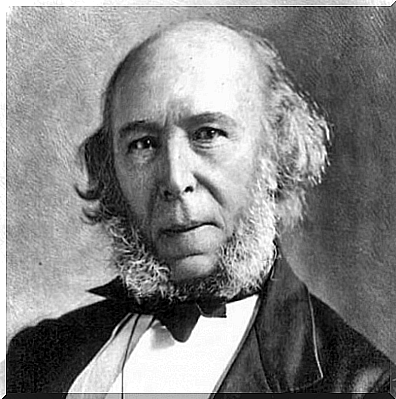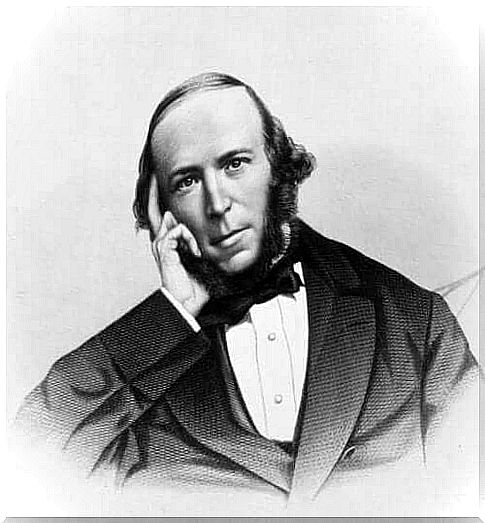Herbert Spencer: Biography And Work

Herbert Spencer was one of the greatest thinkers of his time. This English philosopher, psychologist, sociologist and natural law expert was one of the greatest leaders in social Darwinism and positivism in his time.
In fact, he applied evolutionist laws to philosophy and society. His Darwinist ideas, however, justified the dominance of wise men over the rest, as well as the superiority of a human race over other races.
These ideas were well received in the Western world during the 19th century and the first half of the 20th century. The success of his work proves just that. Spencer even managed to get the attention of many thinkers from very different areas.
Some writers were open to discussing his ideas. Big names like Émile Durkheim, George Edward Moore and Thomas Hill Green were often associated with Spencer. He was undoubtedly a very productive and controversial character.

The biography of Herbert Spencer
First year and education
Herbert Spencer was born into a humble family in 1820 in Derby, England. He died in 1903 in Brighton, England. Although he went to school, he did not learn to read until he was seven years old. In his teens , he studied science, but he never appeared to be a good student.
He studied engineering entirely for himself, and worked in the railway profession between 1837 and 1846. During these years, Herbert continued to learn and study in his own ways and published some books on science and politics. Several years later, in 1948, he became the editor of The Economist .
This change put an end to his career as an engineer and began his new career as a writer and philosopher. In 1851, Spencer published his first official book, Social Statics , in which he predicted that humanity would adapt to life in a society without a need for the state.
Career and books
Spencer used to go to meetings with other like-minded thinkers. Here he met some positivist writers who inspired him to write The Principles of Psychology in 1855. In it he defended that the human mind was subject to natural laws that could be explained through physiology and biology.
Several years later he published A System of Synthetic Philosophy . With this work he wants to prove that the principles of development were equally applicable in philosophy, psychology and sociology. It was one of his greatest works, consisting of ten book volumes that he wrote over a period of 20 years.
At that time, it was not uncommon for philosophy books to be bestsellers. Usually it was novels that took this place. However, Herbert Spencer stood out as a very influential thinker, selling over 1 million copies of his work during his lifetime. He was even nominated for the Nobel Prize in Literature in 1902.
Herbert Spencer and Psychology
Herbert Spencer wrote his work before Darwin. Therefore , he merged associationism and physiology with Lamarckism. Thus, Spencer was several decades ahead in adaptive psychology. He conceptualized development as the process through which the connection between ideas accurately reflects the connection between the dominant events in the environment.
The connections were established by the old principles of continuity and preparedness. This is why the development of the mind represents an adaptive adaptation to environmental conditions. The English writer also coseptualized the brain as an organized register of experiences.
On the other hand, he claimed that instinct was a learned associative habit. He also defended that the mental processes of some species are reduced to the number of associations the brain of the animal in question can carry out. Thus, in other words, the difference between the psychic abilities of certain species, for Spencer, was quantitative.
Herbert Spencer and social Darwinism
Herbert Spencer made several statements on a very controversial topic : He defended that social groups had different abilities to dominate nature and establish their dominance.
For Spencer, society functioned as a biological being. Therefore , he justified the dominance of “superior” races, and spoke in favor of reducing the number of weak people in the world. Thus, imperialism and racism were the basis of his theories.
For him, strong, smart people had to fight to survive, which meant preventing the breakdown of society. Otherwise, if the weak or those who were least able to overpower the strong (physically and intellectually), the country was in danger.

Thoughts on Herbert Spencer’s life and work
To conclude, Spencer defended a positivist, biological, and evolutionary view of philosophy, psychology, and sociology. He considered both learning and physical and mental adaptability to be something very important. However, the work has been misinterpreted to fit the narrative of racists and supremacists, who cited it as scientific evidence for their claims.
The fact that an author’s work is misinterpreted and changed is not something that is exclusive to Herbert Spencer’s work. In fact, this has happened repeatedly throughout history. Something similar happened to Machiavelli and even Nietzsche. Nazis and anti-Semites used their work to support racist allegations. It is not easy to talk about the superiority of one group over another without creating controversy.
Moreover, philosophical and literary works must be interpreted from a certain perspective. Therefore, you should examine when and in what context these ideas were published, so that you can better understand the author’s thoughts.
With controversy and reflection aside, there is no doubt that Herbert Spencer managed to stand out as the greatest interdisciplinary thinker of his time.








